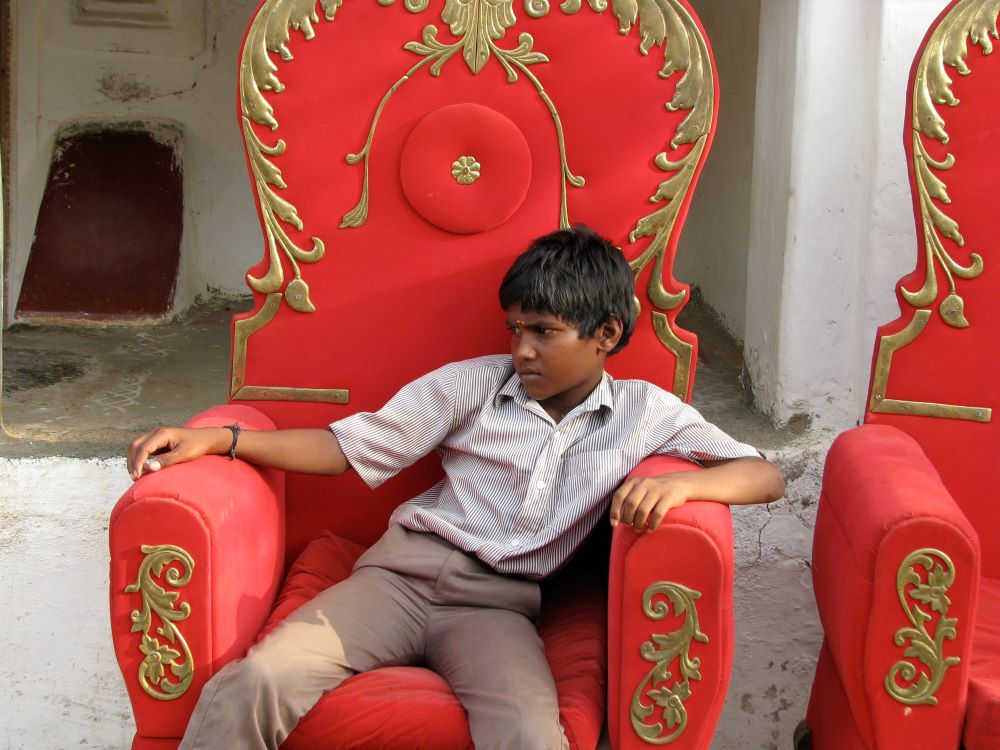
Favoring sons over daughters creates inequality throughout society, including the church, the author writes. (Wikimedia Commons/CC BY-SA 3.0/Mohanatnow)
I was shocked to read in the newspaper about a father of five daughters in Uttar Pradesh's Budaun village who allegedly ripped open the stomach of his pregnant wife to find out if she was going to give birth to a son this time.
On the holiday of Diwali (November 6) the prime minister of India praised the government at Ayodhya for lighting hundreds of thousands of lamps for the festival of light, saying, "Ayodhya is getting back its glory." He was criticized by Surya Pratap Singh, retired principal secretary of the state education department, who observed that "The government used 36,000 litres of mustard oil to light 12 lakh diyas. Thirty per cent people of this state don’t get roti (bread) every day. The government has mocked the state’s poor." Isn’t it a shameful act?
Closer to home, I got a phone call asking if I could help with expenses for twin girls. The mother of the twins explained that she is a single mother and finds it difficult to look after their education and make ends meet. Upon further inquiry, I learned that the father left his wife and twin daughters — because he was hoping for twin sons, as heirs of the family.
Recently I was teaching spoken English to tribal girls. On the morning of the day I was departing, I got the news that the father of one of the students died of alcoholism. This student is the eldest daughter of four. I learned that it was indirect suicide because he was expecting a son, instead of the fourth daughter.
While reflecting on the root cause of these acts, I came across was an article about the Manusmṛiti, a legal text known as the Laws of Manu. "Manusmṛiti, has been single-handedly responsible for the derogatory position accorded to women in the post-Vedic period," Sreyashi Ghosh wrote on Feminism in India. "… Women have always been regarded as the guardians of dharma, custodian and transmitter of patriarchal values."
By and large in my society I see mothers busy moral-policing their neighbors' daughters, and forgetting to tend to their own sons' upbringing. If any woman happened to complain about a neighboring boy's behavior, his mother would retaliate saying, "Boys are boys … you take care of your daughter." These women need to heed the message from Proverbs 19-18: "Discipline your son while there is hope" and "Correct your children, and they will give you comfort" (Proverbs 29:17).
The same discriminatory mentality that devalues women seems to be at work in every sphere of life in society, as well as in the church.
In our Catholic Church Pope Francis is painfully clear about one such root of it — the scourge of clericalism that I think we could say creates a caste system in Catholic Christianity. And the "son option" is a source of the epidemic of clericalism. Some translations of the Bible, such as the English Standard Version, endorsed glorifying the son as heir: " … you may become sons of light" (John 12:36) and "Therefore, you are no longer a slave, but a son; and if a son, then an heir through God" (Galatians 4:7).
And in her book The Mermaid and the Minotaur, feminist psychologist Dorothy Dinnerstein helps me understand that "the discriminative gender arrangements have not only been damaging to human potential but greatly destructive to the environment."
The "son option" has blinded human society to the full contribution of women in all phases. In my Indian society sons are celebrated as the heirs of the family and assets to the family; he is expected to look after the parents in their old age. On the other hand, daughters are still considered liabilities, since after marriage the daughters become the property of their in-laws or husbands.
Among the Indigenous/tribals the girls are sent to free public schools, which are run in the local language, and boys — considered the future breadwinners — are often sent to expensive, prestigious private schools where they are taught in English. The girls are needed to work in the house, look after their younger siblings, and assist their mother in the fieldwork and cooking.
In every Indian culture, to a lesser or greater degree, the birth of a son is preferred. The son is considered the preserver of the family name and heritage, and he is accorded preferential treatment. This also applies to the priest in the church. Women's subordinate status is compounded by the fact that the culture of dependency in which women are raised is perpetuated in religious life, too.
The same discriminatory mentality that devalues women seems to be at work in every sphere of life in society, as well as in the church. The sons are privileged and the daughters are devalued in the family. The priests are privileged and the sisters are devalued in the church. These preferential options must be brought to light. In the battle against evil, silence is no virtue. In her book Dance of the Spirit: The Seven Stages of Women’s Spirituality, Maria Harris comments, "Such silence corrupts not only our world, but also us and our spirituality."
Advertisement
During a May conference with Chilean bishops Pope Francis himself said, "It would be a serious omission on our part, not to delve into the roots... the dynamics that made it possible for such attitudes and evils to occur." Working toward the essential systemic change calls for transformation from within, by overcoming the sin of secrecy about clericalism.
The education of boys stimulates them to be enterprising and innovative, and girls are usually trained to be submissive and docile. By virtue of being male, called by God and having successfully completed seminary formation with its prerequisite of theological studies, men can be ordained. Ordination gives them access to sacramental ministry and church leadership.
Recently I was invited by a group of provincials and formators to share my experiences about vocations to consecrated life, and to brief the group on synodality. Someone told about a couple whose only son had just been ordained in their parish. While I praised their offering of an only son to the priesthood, one of the provincials shared her experience of how two or three congregations are struggling to cope with their priest — who is an only son — as the responsibility of the parents' care had fallen on the congregations, and the priest was unable to fulfill his religious obligations due to his responsibility to take care of the parents. I thought this was an interesting example of culture influencing the role of males.
In his New Year's homily, Pope Francis spoke of the place of women in the church: “To hurt a woman is to insult God, we cannot find a place for women in the Church without allowing the heart of the Woman and Mother to shine"
May common sense prevail in our church and society.







